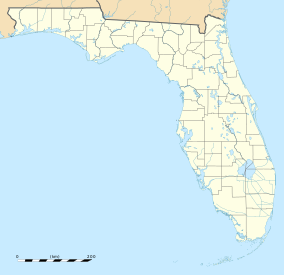Letchworth Mounds
| Letchworth Mounds Archaeological State Park | |
|---|---|
|
IUCN category V (protected landscape/seascape)
|
|

Entrance to the park
|
|
| Location | Jefferson County, Florida, USA |
| Nearest city | Monticello, Florida |
| Coordinates | 30°31′04″N 83°59′30″W / 30.5176869°N 83.9916207°WCoordinates: 30°31′04″N 83°59′30″W / 30.5176869°N 83.9916207°W |
| Governing body | Florida Department of Environmental Protection |
Letchworth Mounds Archaeological State Park is a 188.2 acreFlorida State Park that preserves the state's tallest prehistoric, Native American ceremonial earthwork mound, which is 46 feet (14 m) high. It is estimated to have been built 1100 to 1800 years ago. This is one of three major surviving mound complexes in the Florida Panhandle. It is believed to have been built by the Weedon Island Culture (200-800 CE), Native Americans who lived in North Florida. The hierarchical society planned and constructed massive earthwork mounds as expression of its religious and political system.
The archeological park has exhibits to interpret the artifacts and evidence of nearly 10,000 years of human habitation found at this site. It is located approximately six miles west of Monticello, a half mile south of U.S. 90, in northwestern Florida. The address is 4500 Sunray Road South.
Two related sites in the panhandle are from the later Fort Walton Culture (1100-1550 CE): Fort Walton Mound, a National Historic Landmark; and the Lake Jackson Mounds Archaeological State Park.
The mound has been preserved within a large natural area, which supports such activities as birding, hiking, picnicking and wildlife viewing.
Although the mound now has trees and underbrush growing from it, when originally built, such earthwork mounds were typically clear of vegetation, with smooth prepared sides. Many workers had to bring soils by basket to build the mound. The builders used their knowledge to combine a variety of soils and shells for stability, and usually finished the top and sides with clay.
...
Wikipedia

